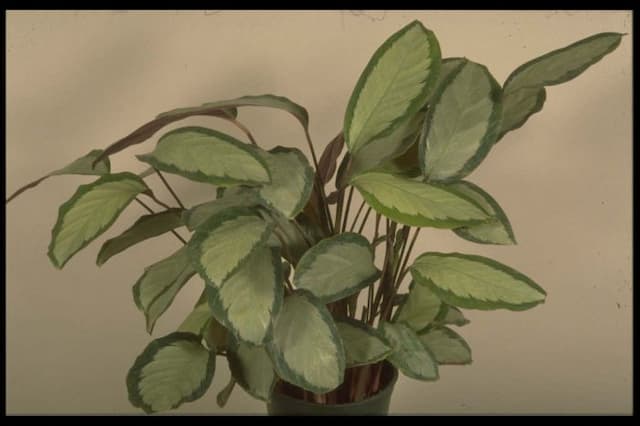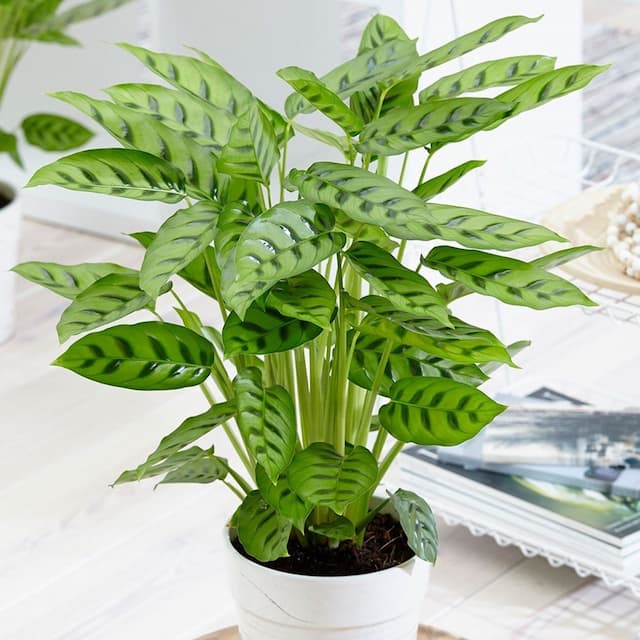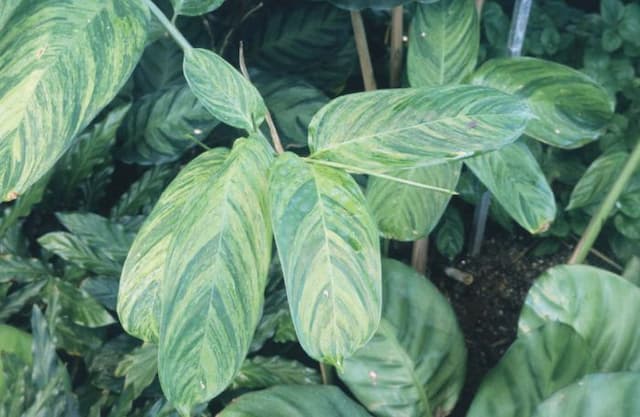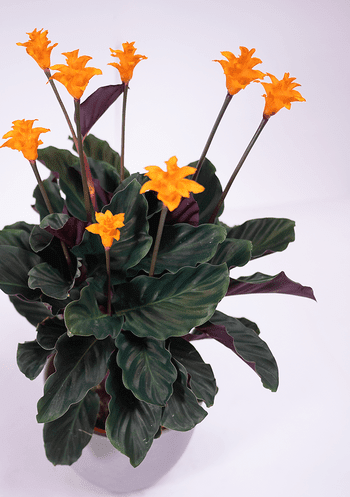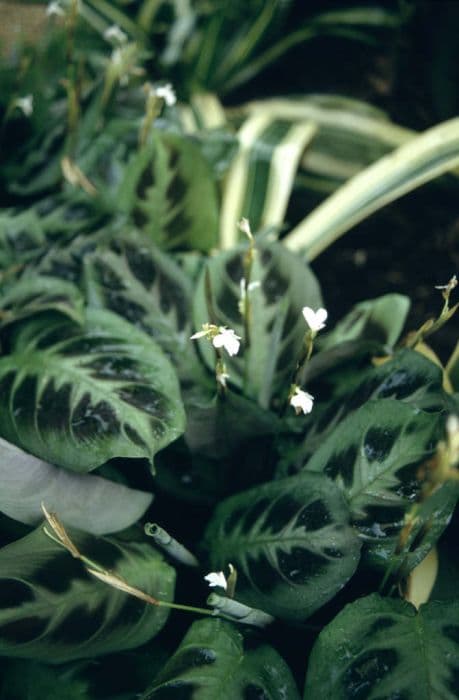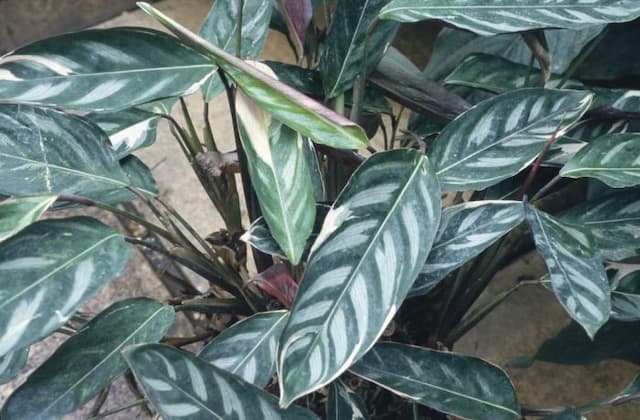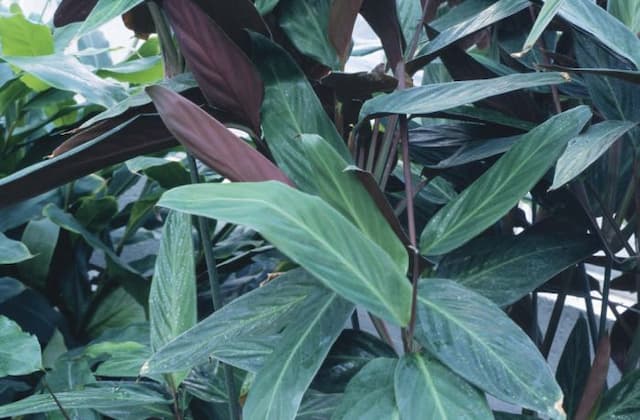Powdery Thalia Thalia dealbata

ABOUT
The plant known commonly as the powdery alligator-flag or hardy canna is a striking aquatic plant with a distinct appearance that is both elegant and robust. It features clumps of long, slender leaves that have a bluish-green hue and a powdery texture, which gives the plant part of its common name. These leaves are somewhat lance-shaped and can arch gracefully, capturing the attention of any onlooker. The plant is also notable for its eye-catching flowers, which stand tall above the foliage on sturdy, erect stems. These blossoms are typically a purplish or reddish color and are arranged in a clustered, spike-like pattern. Each flower exudes a tropical allure, with multiple petals creating an intricate design that's reminiscent of more exotic locales. Adding to its distinctive look, the powdery alligator-flag produces a large, rhizomatous root system that allows it to thrive in wet conditions, typically found near the edges of ponds and in marshy areas. Its overall structure and the way its elements combine make this plant an attractive addition to water gardens and naturalized pond settings, lending a touch of the tropics to temperate landscapes.
About this plant
 Names
NamesFamily
Marantaceae.
Synonyms
Powdery Thalia, Hardy Water Canna, Water Canna, Powdery Alligator-flag.
Common names
Dipteracanthus dealbatus, Maranta dealbata, Thalia barbata, Thalia cana, Thalia dentata, Thalia divaricata, Thalia elliptica, Thalia multiflora, Thalia paniculata, Thalia pubescens, Thalia villosa.
 Toxicity
ToxicityTo humans
Thalia dealbata, commonly known as the powdery thalia, is generally not considered toxic to humans. There is no significant information indicating that the plant has any toxic effects when touched or ingested by people. Therefore, there typically aren't any symptoms of poisoning associated with the powdery thalia.
To pets
The powdery thalia is also not commonly known to be toxic to pets. It does not contain any known toxic substances that would pose a risk to animals if they were to ingest parts of the plant. Consequently, there are no specific symptoms of poisoning related to pets ingesting powdery thalia.
 Characteristics
CharacteristicsLife cycle
Perennials
Foliage type
Deciduous
Color of leaves
Green
Flower color
Purple
Height
6 feet (1.8 meters)
Spread
2 feet (0.6 meters)
Plant type
Herb
Hardiness zones
6
Native area
North America
Benefits
 General Benefits
General Benefits- Water garden aesthetics: Thalia dealbata, commonly known as the Hardy Water Canna, adds a unique vertical element and aesthetic appeal to water gardens and ponds with its striking foliage and flowers.
- Wildlife habitat: Provides a natural habitat for aquatic wildlife, including a safe place for fish to hide and for dragonflies and other beneficial insects to perch and lay eggs.
- Erosion control: The root system of Thalia dealbata can help stabilize pond banks and prevent soil erosion around water bodies.
- Shade and temperature regulation: The large leaves of the plant can provide shade for smaller aquatic plants and help regulate water temperature, protecting aquatic ecosystems.
- Privacy: The tall and dense growth of Hardy Water Canna can serve as a natural screen, providing privacy around garden ponds.
- Low maintenance: Once established, it requires minimal care, making it a suitable choice for gardeners seeking low-maintenance pond plants.
 Medical Properties
Medical PropertiesThis plant is not used for medical purposes.
 Air-purifying Qualities
Air-purifying QualitiesThis plant is not specifically known for air purifying qualities.
 Other Uses
Other Uses- Thalia dealbata, commonly known as the Powdery Thalia, can be used as a decorative element in floral arrangements due to its striking foliage and architectural presence.
- The dried stems of Powdery Thalia are sometimes utilized in crafting, as they can be used to create natural frames or support structures for other materials.
- When planted along the banks of ponds and water features, Powdery Thalia can help stabilize the soil and reduce erosion with its extensive root system.
- The Powdery Thalia's large leaves can be used as a natural wrapping material for small parcels and gifts in eco-friendly packaging options.
- In ponds, Powdery Thalia can provide shade for aquatic life and can help moderate water temperature fluctuations.
- Fishermen in some regions may use the Powdery Thalia as a marker plant to indicate water depths or the presence of certain fish species.
- Photographers and artists may use Powdery Thalia as a backdrop or subject matter for its aesthetic appeal in ponds and garden settings.
- Powdery Thalia can serve as a privacy screen when planted in rows or clumps due to its dense growth and height.
- In outdoor education, the Powdery Thalia can be used to teach about wetland ecosystems and the importance of native plant species in natural water filtration.
- The fibers from Powdery Thalia's stems were historically used by indigenous peoples to weave into mats, baskets, or as binding material.
Interesting Facts
 Feng Shui
Feng ShuiThe Powder Puff is not used in Feng Shui practice.
 Zodiac Sign Compitability
Zodiac Sign CompitabilityThe Powder Puff is not used in astrology practice.
 Plant Symbolism
Plant Symbolism- Grace and Beauty: Thalia dealbata, commonly known as the Powdery Alligator-flag, often represents grace and beauty due to its elegant, arching stems and attractive flowers.
- Balance: The well-proportioned growth pattern of the Powdery Alligator-flag is sometimes associated with balance and harmony in life.
- Cleansing: As a plant thriving in aquatic environments, it is often symbolic of cleansing and the purification of one's surroundings.
 Water
WaterThe Powdery Thalia should be grown in wet soil or shallow water, making the traditional method of watering not applicable. Instead, it should be planted in a location where the soil can remain consistently moist or partially submerged. If grown in a container, such as a pond basket, ensure the roots and substrate are covered with at least 2 inches of water at all times. Check water levels weekly and add water to maintain the desired depth, especially during hot or windy conditions that may increase evaporation. Typically, for outdoor pond settings, replenishing the pond with several gallons of water per week may be sufficient to maintain appropriate water levels, adjusting for rainfall and temperature changes.
 Light
LightThe Powdery Thalia thrives best in full sunlight to partial shade. An ideal spot for this plant would be one where it can receive at least six hours of direct sunlight per day. Avoid deeply shaded areas, as insufficient light can impede its growth and flowering potential. If grown indoors, a bright sunroom or a spot near a south-facing window where it can get ample light would be suitable.
 Temperature
TemperatureThe Powdery Thalia prefers warm temperatures and is hardy in USDA zones 5 through 10. It can tolerate temperatures as low as 20 degrees Fahrenheit, but growth will be best when temperatures are consistently above 50 degrees Fahrenheit. The ideal temperature range for this plant is between 70 and 90 degrees Fahrenheit. It should be protected from frost, which can cause damage to the foliage and stems.
 Pruning
PruningPruning the Powdery Thalia helps maintain its shape and encourages new growth. Trim away dead or damaged leaves and stems throughout the growing season to keep the plant looking tidy and promote health. The best time for a more thorough pruning is in the late winter or early spring, just before new growth starts. Prune older leaves and any flower stalks that have finished blooming to rejuvenate the plant for the coming season.
 Cleaning
CleaningAs needed
 Soil
SoilThe best soil mix for Hardy Water Canna (Thalia dealbata) involves a loamy, rich organic material with a pH between 6.0 and 7.5, heavily amended with compost to hold moisture.
 Repotting
RepottingHardy Water Canna should be repotted every 2 to 3 years to refresh the soil and promote healthy growth; spring is the best time for repotting.
 Humidity & Misting
Humidity & MistingHardy Water Canna thrives in high humidity conditions typically found in its natural wetland habitat; 60% to 80% humidity is ideal.
 Suitable locations
Suitable locationsIndoor
Use large pots, rich soil, ample water, and full sun for indoor Hardy Water Canna.
Outdoor
Plant in pond margins or wet soil, full sun, and ensure consistent moisture for outdoor growth.
Hardiness zone
6-11 USDA
 Life cycle
Life cycleThalia dealbata, commonly known as the Powdery Alligator-flag, begins its life cycle as a seed that germinates in warm, shallow water, where its roots anchor into the muddy substrate. As it matures, the plant develops long, reed-like stems with powdery blue-green leaves and a rhizomatous root system that enables it to spread and colonize areas rapidly. When it reaches reproductive maturity, usually in the summer, Thalia dealbata produces tall flower stalks bearing purple flowers that are pollinated by insects, particularly bees. After pollination, the flowers develop into capsule-like fruits containing numerous seeds. The plant continues to grow vegetatively and may die back in winter in cooler climates, but its rhizomes survive to sprout new growth when conditions improve in the spring. Over time, this perennial can form large, dense stands around the margins of ponds and waterways where it significantly contributes to the local ecology.
 Propogation
PropogationPropogation time
Spring-summer
Propogation: Thalia dealbata, commonly known as the hardy water canna, is best propagated by division, which is typically done in late winter or early spring before new growth begins. When dividing the plant, gardeners should carefully lift the clump from the water or wet soil, using a spade or a fork to minimize damage to the roots. Once out of the ground, the root mass can be divided into sections, ensuring that each division has at least one growing point or shoot. These divisions can then be replanted in a mix of loamy soil and water at a shallow depth, with the growing points just above the soil surface, allowing them to quickly establish and begin new growth. It's important to maintain adequate moisture after planting to facilitate root development and to place them in full to partial sunlight, replicating their natural wetland environment.


